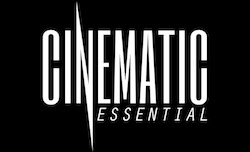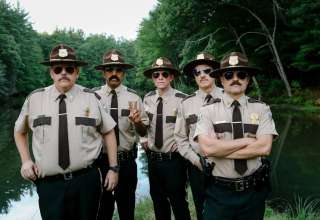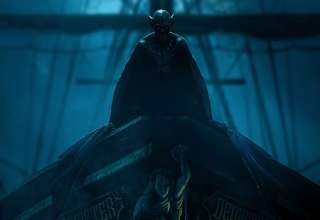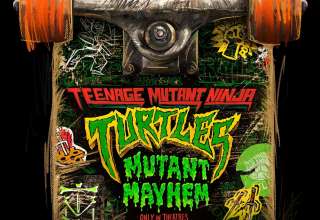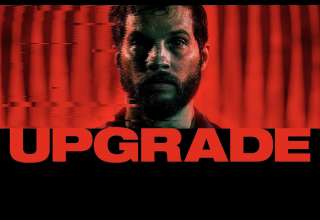For Jake Gyllenhaal and Jeff Bauman, there was a bit of a risk being taken with Stronger that is sure to alter their lives to some degree. With Bauman’s being more personal and Gyllenhaal’s being more professional, these two are both exposing themselves to the world. What they’re doing with Stronger could be absolutely frightening to people who don’t want to take a change in life, but the rewards could also be rewarding in a way that no one could ever imagine.
Cinematic Essential: How much did you know about Jeff (Bauman) going into the film?
Jake Gyllenhaal: I had really only seen the photograph of Jeff before I read the screenplay. I hadn’t read the book until I read the screenplay, so it was sort of in reverse order in this case. Really it was just that image, which was a very generalized image sent out by the media. I never thought in a million years that our lives would intersect in the way that they have. Now you could probably ask me the idiosyncrasies of his family and I’d probably be able to answer (laughing), but at thee time, I just saw that image.
You two are pretty tight now.
Gyllenhaal: Yup, unfortunately for him.
Jeff Bauman: Well, I’m just happy you finally have a close friend.
Gyllenhaal: Whenever I’m asked about my work or my life, he (Jeff) always says that I have no life and no friends. Yeah, I have one friend now.
How much time did you spend together before filming?
Bauman: We spent about a year and a half, off and on. You were busy doing stuff. Then he would come back to Boston and we would chill and do things. Hit comedy shows and eat.
Gyllenhaal: Pretty much, yeah. As we got closer to production we sort of set up camp here and we were here for about six months prior to filming. And since I was producing the movie as well, I was here and driving back and forth to New York every 3 or 4 days for about five months. I live in New York. In that period of time, while we were location scouting, casting and things like that, we’d go out to dinner, hang out or go to Jeff’s house. It would be me and David (Gordon Green) going over to Jeff’s or Jeff coming to us or me going to see Jeff alone. Throughout all of it, we always texted.
Were you worried about how people would see you or your family after this?
Bauman: I’m not really worried about how people see me, but my family, yeah. Family’s tough. I’m not them. It’s like where do I draw the line on their privacy and where do we draw the line in order to keep this story truthful? That was probably the biggest challenge going into it and how far we could go with it. Right now my mom is kind of sore at me.
Gyllenhaal: She was psyched though after the reviews came out and was like “Oh, no wait. I’m not so sore.”
Bauman: She’s my mother she wants me to be successful, but she’s also like “My apartment is not that dirty. Why is there stuff everywhere?” She’s kind of immaculate and very meticulous in what she has in her apartment. it’s like OCDish, so she was really upset about that.
Have the rest of your family and friends seen the film yet?
Bauman: Yes, most of them.
Gyllenhaal: You guys all saw it in June though? Mostly everybody.
Bauman: Yeah, yeah. It hits home to everybody. During this whole process, I was very isolated. That’s why it was probably so hard for Jake to crack who I was because I don’t really open up. I was going through a rough time in my head as you saw in the film. I was in a rough spot.
Has this time been therapeutic?
Bauman: Yeah, in a way. I do a lot of public speaking now. I go around and tell my story. I’ve been doing that and that has been really therapeutic. Getting my story out there to a group of people and doing Q and A’s. The movie has been really interesting to be a part of and to see what goes into making one is really cool. Then to have the finished product make me cry and makes me think of what I went through and where I am now.
How do you even prepare for something like this?
Gyllenhaal: In truth, I don’t think there’s any real preparation. The experience Jeff had, as he always says is like being sucker punched. there’s no preparation for that experience. All I can say is that the process that Jeff went through, the rehabilitation and recovery, I tried to learn everything I could about it. I tried to understand exactly what it’s like, what the surgeries are like, the painkillers and the process of even that suture scene came from us saying that we want to show how painful this is. So there’s a lot of that. Where you get an understanding is not just from Jeff, but from everyone around him. The layers of people who helped. it’s from their experiences and other people who’ve been through trauma. It goes very deep so there’s a lot of research, there’s a lot of talks.
You guys used some of the real hospital staff in the movie.
Gyllenhaal: Dr. Kalish is in the movie, Odessa (Jeff’s nurse) is in the movie, Michelle (Jeff’s PT) is in the movie. All of those people are in the movie because we (He and Gordon Green) had a meeting with Dr. Kalish to understand all the things he had to do and David couldn’t cast an actor who could do the doctor part that well. So he turned to me and was like “What if Dr. Kalish played the doctor?” So we had him audition and he was horrible. He couldn’t say the lines but then we figured we could have him just talk to my character the way he would talk to any patient and the way he would talk to Jeff and Jeff’s parents when he had to tell them the news. So he told Miranda (Richardson) and Clancy (Brown) the same way he told Jeff’s parents after he walked in the room. It wasn’t written. And the same thing in that suture scene. He’s just telling me how it goes and the nurses are walking around talking to me like they would talk to me normally.
What it’s like for you now since you’re stepping into the role of producer more?
Gyllenhaal: I’ve been doing this for a while now. I grew up in a family of people who happen to make films. It’s a family business and I love the other aspects of film besides acting. I’ve produced a couple of films, but this is the first film that my company has produced. So there’s a lot at stake there always there for me. It’s a really important story already as it is, but there are other things at stake for me, you know? And as a result, I put my heart and my soul into it, because this story needs to be told and not a lot of people would have made it. It was hard to get made but in terms of involvement, it was a 24/7 job. I didn’t have a day off for a good year. As soon as we knew this was going to get made, my producing partner and I scoffed at anybody who got a day off because we certainly didn’t. And the same thing with Todd Lieberman and David Gordon Green. It hasn’t stopped and it doesn’t stop until this movie comes out and even then it won’t stop. I was involved in almost every discussion every step of the way. This isn’t a vanity project for me. This is a project that has unluckily got my blood and sweat and tears. And I’m a smelly guy. That’s just a part of it. I love making movies.
Bauman: This isn’t a vanity project?
Gyllenhaal: No, but I think people think that when actors produce movies. I would say the person who sacrificed the most to get this movie made was Todd Lieberman, the man who bought the rights to the book and developed and brought people on and John Pollono on and made those first early very difficult choices when certain people didn’t even believe in it. We joined up and realized movies like this don’t get made that often because it’s just a changing world. But we knew in our hearts that it would be a movie that people would see somewhere and it needed to be told.
What was the first thing you said to Jake after seeing the film?
Gyllenhaal: I can tell you with a text.
Bauman: Good job.
Gyllenhaal: Yeah, you did. I was like “What the f*ck does that mean (laughs)?
Bauman: Yeah, I said good job, then I went to sleep.
How do you take a local story and turn it into a global success?
Gyllenhaal: Every story is a local story. You know what I mean? I don’t think Thor is a local story (laughs).
Bauman: I was thinking that. But then we go to Toronto and 2800 people clap and everyone liked it and took something from it. I was thinking the same thing: How do we get it out of Boston? I was scared of going to Toronto.
Gyllenhaal: I don’t think you guys realize how much of an inspiration you are. Maybe that’s what it is. I think maybe that’s the feeling. And that’s a wonderful thing. I think there’s that thing in Boston. There’s that humility, but there’s also like a fierce strength and this small town nature but it is global. His story is about anybody who’s struggling, anybody who’s in a space they fear they will never get out of it, anybody who has lost anything. We are all struggling or know somebody who is struggling. Jeff said it on his Facebook page, “It doesn’t have to make headlines to be hard.” That’s the reason this story is for anyone. It’s the reason why we have to go “door to door.” We don’t have a lot of opportunity and budget to get it out there like a lot of movies so we are going door to door. I mean I’m convinced if I have to go to people’s houses and take them off their couch to get them to see this movie, I’m going to do it.
Bauman: I’ll do it too (laughs).
Gyllenhaal: We’re walking there together. When this trailer came out, it was so crazy. The response to this trailer all over the world. I was in Spain and people knew about that trailer. I went down a rabbit hole of watching trailer reactions. First of all, I can’t believe people film themselves watching trailers, but it’s really incredible because every time the end of that trailer people would say stuff like “My mom has MS (Multiple Sclerosis) and there’s days where it doesn’t feel like she can get out of bed and yet she does” or “My dad has parkinson’s” or this girl I saw talk was like “I have these things on my wrists because I have arthritis and sometimes the pain’s so much that I don’t want to go outside, but something like this makes me realize that I can go outside.” It’s the same thing in one of the last scenes in the movie. What is your story? Everybody has one. That’s what Jeff brings out. That you can get to a better place than you thought you could even when you’re in your darkest place.
